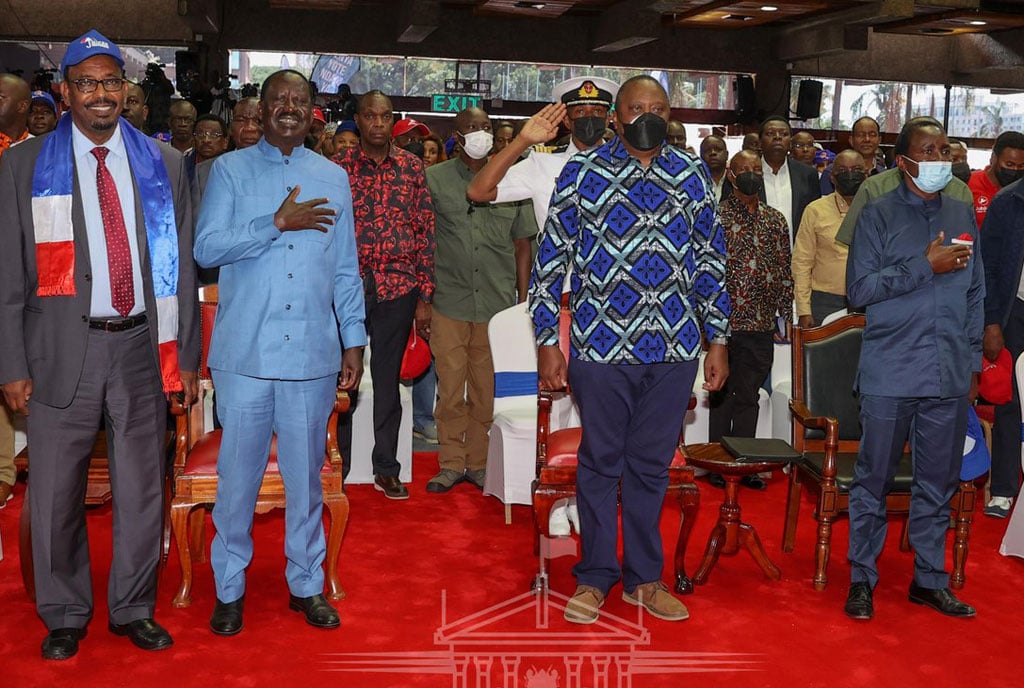We've chosen Raila to be Kenya's 5th president, says Uhuru Kenyatta

Kenyan opposition candidate Raila Amolo Odinga stands by President Uhuru Kenyatta (black mask) during the Azimio La Umoja National Delegates Conference (NDC) at the Kenyatta International Convention Centre (KICC) in Nairobi City County on March 12, 2022. PHOTO/COURTESY
What you need to know:
- The announcement brings together two of Kenya's top political dynasties, who have a long history of opposing each other at the ballot box.
Kenyan President Uhuru Kenyatta on Saturday endorsed his former arch-rival for the country's top job, weeks after their parties joined forces ahead of presidential and parliamentary elections in August.
"We have chosen Raila Odinga without any opposition to be the fifth president of Kenya," Kenyatta told a cheering crowd numbering thousands in the capital Nairobi.
The announcement brings together two of Kenya's top political dynasties, who have a long history of opposing each other at the ballot box.
But in 2018, Kenyatta and Odinga stunned the country when they shook hands and declared a truce after post-election violence in 2017 left dozens of people dead.
Last month, Kenyatta's Jubilee party announced that it would join the Azimio la Umoja (Quest for Unity) coalition headed by Odinga.
On Saturday, Kenyatta declared his backing for the veteran opposition leader, saying: "We don't have any doubt that we have a team captain in Raila Amolo Odinga."
Odinga, 77, responded, saying that the pair's journey from bitter electoral rivals to political partners "has been the most unlikely in the history of our country."
"I accept the nomination with absolute gratitude and dedication to our people," he added.
At a rally later in the day, the duo, both wearing matching blue caps, danced to a song by Odinga with the lyrics: "Leo ni leo. Inawezekana" (Today is the day. It is possible).
The announcement came after Kenyatta's previously anointed successor William Ruto, who also intends to contest the presidential election, was sacked from Jubilee.
Ruto, 54, was initially anointed by Kenyatta as his successor but found himself marginalised after the 2018 pact between the president and his former foe.
Ruto has positioned himself as a leader looking to upend the status quo and stand up for the "hustlers" trying to survive in a country ruled by "dynasties" -- a reference to the Kenyatta and Odinga families which have dominated politics for decades.
Election violence
The East African powerhouse has traditionally been ruled by presidents from the dominant Kikuyu tribe like Kenyatta or the Kalenjin tribe like Ruto.
This year's contest is shaping up to be a two-horse race between Ruto and Odinga, who belongs to the Luo tribe.
A former political prisoner and prime minister, Odinga has secured the support of at least 26 parties which are now part of the Azimio la Umoja coalition.
ALSO READ: Prepare for the Kenya polls
But his image as a fiery anti-establishment leader has taken a knock following "the handshake" with Kenyatta.
The duo have unsuccessfully tried to introduce sweeping constitutional changes, claiming that the reforms would help to end repeated cycles of election violence.
Although Ruto has said he will accept the election results, he has also brought up the possibility of state-backed vote rigging.
During a visit to the United States last week, Ruto said: "The biggest issue on the ballot is the democracy of our nation and whether we truly have the opportunity to make free choices devoid of blackmail, threats and intimidation."
"The only concern that many Kenyans have is the intrusion by agencies to try and manipulate decisions of people at different levels."
Both Kenyatta and Ruto had been indicted by the International Criminal Court on crimes against humanity charges for their alleged role in orchestrating post-poll violence in 2007 that cost more than 1,100 lives.
The cases later collapsed, with former ICC chief prosecutor Fatou Bensouda saying a relentless campaign of victim and witness intimidation made a trial impossible.
The reforms pursued by Kenyatta and Odinga proposed expanding the executive and parliament to more evenly divide the spoils of victory.
But they were seen by critics as a way to enable Kenyatta -- a two-term president who cannot run again -- to remain in power by establishing the post of prime minister.
The government has appealed a court ruling that rejected the proposals and said Kenyatta could even be sued in a civil court for launching the process.





